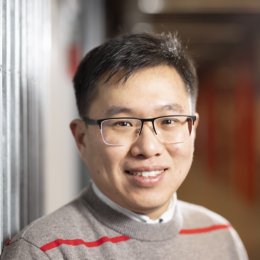Soil Infrastructure Interaction
I am Hongyang Cheng, and I obtained my PhD in 2016 and joined the Multi-Scale Mechanics group of the University of Twente as a postdoc. In November 2020, I moved to the Construction and Management Engineering group, as assistant professor of geomechanics.
Background
Granular media are ubiquitous in nature and are the second most processed material in global industry after water. I study them (e.g., soils, rocks, and powders) and create predictive tools to model their behaviour. Utilizations of these tools are, for example, to make dykes safer and more resilient to climate change, to inform the public about the risks of (induced) earthquakes, and to manufacture tailor-made smart materials.
My research focuses on understanding the physical processes in granular materials where micromechanics is important, and relevant length/time scales are not well defined. To do this, I develop and integrate multi-scale modelling and machine learning techniques to bridge geomechanical models at micro and macro scales.
The focus of this position is about the multi-scale behaviour of soils. New research and novel techniques are needed to make the connections between predictive models of granular materials, at different length/time scales. It is also crucial to integrate observation data and numerical simulations (e.g., multi-scale and hydro-mechanical), within a unified framework. These new tools will be utilised towards solving urgent engineering problems, such as waves and noises in saturated soils (related to seismicity) and drying/wetting of rooted soil (related to climate change). Both projects are funded by the Sectorplan.
In the years to come
In the coming years, I want to develop computational-statistical tools for Integrated Computational Materials & Engineering (ICME) to advance the understanding and modelling of granular materials in all physical states, as well as their transitions. To this end, my research will focus on the development of open-source tools for multi-scale and multi-phase/physics modelling, Bayesian inference, and microscopic observation, and apply them to:
- Multi-scale modelling of fluid-solid transition in granular materials;
- Wave propagation in dry and saturated soils;
- Root-soil-water interaction during drying-wetting cycles.

Figure 1 Integration of monitoring and advanced modelling of geotechnical data via effective machine learning
Education
My field of research is related to the safety and risk assessment of infrastructures such as dikes and roads. In the Civil Engineering Department, I teach the MSc course Geo Risk Management, and in module 9 of the bachelor programme Smart Cities – Multifunctional Flood Defences on the topic of dike safety. I am also a regular teacher in MSc courses offered by the Thermal and Fluid Engineering Department, including Granular Matter and Advanced Programming in Engineering.
Collaborations
Previously, I have worked with industries on research projects to understand how granular materials behave and how to efficiently handle/process them to meet industrial needs. These projects are mainly funded by Oil and Gas (e.g., Eni S.p.A.), geotechnical, and pharmaceutical companies. I have also supervised MSc students who worked directly within companies, including Sweco and Siemens Gamesa, to create knowhow about drying/wetting of dykes and offshore foundations.

